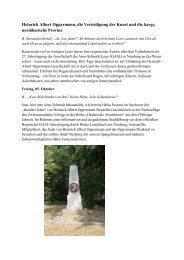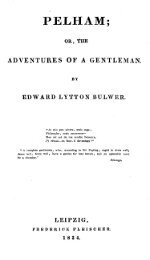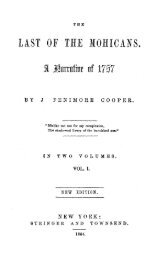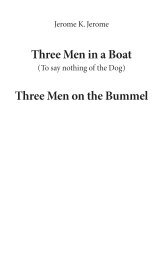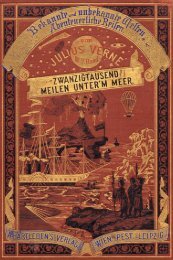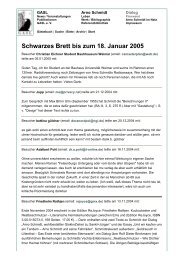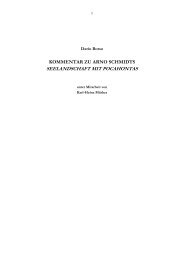- Page 1 and 2:
T O B I A S S M O L L E T T The Exp
- Page 3:
T O B I A S S M O L L E T T The Exp
- Page 6 and 7:
2 TO MR. HENRY DAVIS Thirdly, with
- Page 8 and 9:
4 TO THE REVD. MR. JONATHAN DUSTWIC
- Page 10 and 11:
6 TOBIAS SMOLLETT is able. I desire
- Page 12 and 13:
8 TOBIAS SMOLLETT To Sir WATKIN PHI
- Page 14 and 15:
10 TOBIAS SMOLLETT but I hope to so
- Page 16 and 17:
12 TOBIAS SMOLLETT good-natured sim
- Page 18 and 19:
14 TOBIAS SMOLLETT he said, that ra
- Page 20 and 21:
16 TOBIAS SMOLLETT feelings of my h
- Page 22 and 23:
18 TOBIAS SMOLLETT had reason to be
- Page 24 and 25:
20 TOBIAS SMOLLETT that he declined
- Page 26 and 27:
22 TOBIAS SMOLLETT wrists, endeavou
- Page 28 and 29:
24 TOBIAS SMOLLETT a paltry advanta
- Page 30 and 31:
26 TOBIAS SMOLLETT moment—it was
- Page 32 and 33:
28 TOBIAS SMOLLETT intercourse with
- Page 34 and 35:
30 TOBIAS SMOLLETT a person he did
- Page 36 and 37:
32 TOBIAS SMOLLETT and exerted hims
- Page 38 and 39:
34 TOBIAS SMOLLETT You must know, I
- Page 40 and 41:
36 TOBIAS SMOLLETT and rivers in th
- Page 42 and 43:
38 TOBIAS SMOLLETT brought from the
- Page 44 and 45:
40 TOBIAS SMOLLETT the bath, as wel
- Page 46 and 47:
42 TOBIAS SMOLLETT ceremony to her
- Page 48 and 49:
44 TOBIAS SMOLLETT woman, and I are
- Page 50 and 51:
46 TOBIAS SMOLLETT my blood run col
- Page 52 and 53:
48 TOBIAS SMOLLETT any other race,
- Page 54 and 55:
50 TOBIAS SMOLLETT upon himself—H
- Page 56 and 57:
52 TOBIAS SMOLLETT cash, his counse
- Page 58 and 59:
54 TOBIAS SMOLLETT distinction—Tr
- Page 60 and 61:
56 TOBIAS SMOLLETT his company; and
- Page 62 and 63:
58 TOBIAS SMOLLETT To Miss LÆTITIA
- Page 64 and 65:
60 TOBIAS SMOLLETT hours before we
- Page 66 and 67:
62 TOBIAS SMOLLETT I cannot bear to
- Page 68 and 69:
64 TOBIAS SMOLLETT public breakfast
- Page 70 and 71:
66 TOBIAS SMOLLETT a compound of vi
- Page 72 and 73:
68 TOBIAS SMOLLETT beg pardon for i
- Page 74 and 75:
70 TOBIAS SMOLLETT apparel, appears
- Page 76 and 77:
72 TOBIAS SMOLLETT I could sware to
- Page 78 and 79:
74 TOBIAS SMOLLETT manifest agitati
- Page 80 and 81:
76 TOBIAS SMOLLETT and judgment of
- Page 82 and 83:
78 TOBIAS SMOLLETT about vails; and
- Page 84 and 85:
80 TOBIAS SMOLLETT This was not the
- Page 86 and 87:
82 TOBIAS SMOLLETT a filthy tatterd
- Page 88 and 89:
84 TOBIAS SMOLLETT what other accom
- Page 90 and 91:
86 TOBIAS SMOLLETT with great emoti
- Page 92 and 93:
88 TOBIAS SMOLLETT every broker and
- Page 94 and 95:
90 TOBIAS SMOLLETT from all the ris
- Page 96 and 97:
92 TOBIAS SMOLLETT the whole surfac
- Page 98 and 99:
94 TOBIAS SMOLLETT which, in spite
- Page 100 and 101:
96 TOBIAS SMOLLETT in a husband, to
- Page 102 and 103:
98 TOBIAS SMOLLETT of faculty, to l
- Page 104 and 105:
100 TOBIAS SMOLLETT all—’ I obs
- Page 106 and 107:
102 TOBIAS SMOLLETT publication, an
- Page 108 and 109:
104 TOBIAS SMOLLETT press, from whe
- Page 110 and 111:
106 TOBIAS SMOLLETT street who will
- Page 112 and 113:
108 TOBIAS SMOLLETT I beheld in my
- Page 114 and 115:
110 TOBIAS SMOLLETT To Sir WATKIN P
- Page 116 and 117:
112 TOBIAS SMOLLETT he) notwithstan
- Page 118 and 119:
114 TOBIAS SMOLLETT ran up, and, hu
- Page 120 and 121:
116 TOBIAS SMOLLETT this performanc
- Page 122 and 123:
V O L U M E I I To Dr. LEWIS DEAR L
- Page 124 and 125:
120 TOBIAS SMOLLETT of any delicacy
- Page 126 and 127:
122 TOBIAS SMOLLETT loathing. It wa
- Page 128 and 129:
124 TOBIAS SMOLLETT To Sir WATKIN P
- Page 130 and 131:
126 TOBIAS SMOLLETT of his caprice.
- Page 132 and 133:
128 TOBIAS SMOLLETT many years by w
- Page 134 and 135:
130 TOBIAS SMOLLETT Cropdale metamo
- Page 136 and 137:
132 TOBIAS SMOLLETT flattered him i
- Page 138 and 139:
134 TOBIAS SMOLLETT To Miss LÆTITI
- Page 140 and 141:
136 TOBIAS SMOLLETT Mrs. Jenkins, w
- Page 142 and 143:
138 TOBIAS SMOLLETT she was a good
- Page 144 and 145:
140 TOBIAS SMOLLETT by the preacher
- Page 146 and 147:
142 TOBIAS SMOLLETT my precious sis
- Page 148 and 149:
144 TOBIAS SMOLLETT his power to pr
- Page 150 and 151:
146 TOBIAS SMOLLETT sagacious enoug
- Page 152 and 153:
148 TOBIAS SMOLLETT your humble ser
- Page 154 and 155:
150 TOBIAS SMOLLETT so effectually,
- Page 156 and 157:
152 TOBIAS SMOLLETT medicine, will
- Page 158 and 159: 154 TOBIAS SMOLLETT must own, I sho
- Page 160 and 161: 156 TOBIAS SMOLLETT O Mary Jones, p
- Page 162 and 163: 158 TOBIAS SMOLLETT fresh from his
- Page 164 and 165: 160 TOBIAS SMOLLETT ‘Sir, ‘I co
- Page 166 and 167: 162 TOBIAS SMOLLETT be some origina
- Page 168 and 169: 164 TOBIAS SMOLLETT Burdock, who ma
- Page 170 and 171: 166 TOBIAS SMOLLETT declaring, that
- Page 172 and 173: 168 TOBIAS SMOLLETT expected to kee
- Page 174 and 175: 170 TOBIAS SMOLLETT Mr. Grieve had
- Page 176 and 177: 172 TOBIAS SMOLLETT a good sort of
- Page 178 and 179: 174 TOBIAS SMOLLETT in the apotheca
- Page 180 and 181: 176 TOBIAS SMOLLETT humble slave fr
- Page 182 and 183: 178 TOBIAS SMOLLETT observed, that
- Page 184 and 185: 180 TOBIAS SMOLLETT a fortress, is
- Page 186 and 187: 182 TOBIAS SMOLLETT I have here met
- Page 188 and 189: 184 TOBIAS SMOLLETT of the cold. Cl
- Page 190 and 191: 186 TOBIAS SMOLLETT surmounted by t
- Page 192 and 193: 188 TOBIAS SMOLLETT first collier,
- Page 194 and 195: 190 TOBIAS SMOLLETT must have been
- Page 196 and 197: 192 TOBIAS SMOLLETT scripture.’
- Page 198 and 199: 194 TOBIAS SMOLLETT dram-drinking,
- Page 200 and 201: 196 TOBIAS SMOLLETT (answered the l
- Page 202 and 203: 198 TOBIAS SMOLLETT agreeable offer
- Page 204 and 205: 200 TOBIAS SMOLLETT the Scots, who
- Page 206 and 207: 202 TOBIAS SMOLLETT To Dr. LEWIS DE
- Page 210 and 211: 206 TOBIAS SMOLLETT concurrence; in
- Page 212 and 213: 208 TOBIAS SMOLLETT To Sir WATKIN P
- Page 214 and 215: 210 TOBIAS SMOLLETT to kill one ano
- Page 216 and 217: 212 TOBIAS SMOLLETT young lady of f
- Page 218 and 219: 214 TOBIAS SMOLLETT ignorant in thi
- Page 220 and 221: 216 TOBIAS SMOLLETT which it has at
- Page 222 and 223: 218 TOBIAS SMOLLETT of the door; fo
- Page 224 and 225: 220 TOBIAS SMOLLETT no dog shall ha
- Page 226 and 227: 222 TOBIAS SMOLLETT had compassion
- Page 228 and 229: 224 TOBIAS SMOLLETT are universally
- Page 230 and 231: 226 TOBIAS SMOLLETT another, that t
- Page 232 and 233: 228 TOBIAS SMOLLETT Fraser) I wad n
- Page 234 and 235: 230 TOBIAS SMOLLETT was put about,
- Page 236 and 237: 232 TOBIAS SMOLLETT be no differenc
- Page 238 and 239: 234 TOBIAS SMOLLETT a convent. Edin
- Page 240 and 241: 236 TOBIAS SMOLLETT To Sir WATKIN P
- Page 242 and 243: 238 TOBIAS SMOLLETT nature. I belie
- Page 244 and 245: 240 TOBIAS SMOLLETT above all the v
- Page 246 and 247: 242 TOBIAS SMOLLETT at an open wind
- Page 248 and 249: 244 TOBIAS SMOLLETT follow the sun
- Page 250 and 251: 246 TOBIAS SMOLLETT Europe; and, wi
- Page 252 and 253: 248 TOBIAS SMOLLETT The first, from
- Page 254 and 255: 250 TOBIAS SMOLLETT Devolving from
- Page 256 and 257: 252 TOBIAS SMOLLETT night gown. He
- Page 258 and 259:
254 TOBIAS SMOLLETT dangerous enter
- Page 260 and 261:
256 TOBIAS SMOLLETT fishery cannot
- Page 262 and 263:
258 TOBIAS SMOLLETT less than mirac
- Page 264 and 265:
260 TOBIAS SMOLLETT take all her mi
- Page 266 and 267:
262 TOBIAS SMOLLETT —I doubt her
- Page 268 and 269:
264 TOBIAS SMOLLETT for a gentleman
- Page 270 and 271:
266 TOBIAS SMOLLETT mansion, with s
- Page 272 and 273:
268 TOBIAS SMOLLETT his American pr
- Page 274 and 275:
270 TOBIAS SMOLLETT On the little r
- Page 276 and 277:
272 TOBIAS SMOLLETT have willingly
- Page 278 and 279:
274 TOBIAS SMOLLETT To Mrs. GWYLLIM
- Page 280 and 281:
276 TOBIAS SMOLLETT senses will off
- Page 282 and 283:
278 TOBIAS SMOLLETT unturned, to ca
- Page 284 and 285:
280 TOBIAS SMOLLETT Scots in genera
- Page 286 and 287:
282 TOBIAS SMOLLETT upon, so as to
- Page 288 and 289:
284 TOBIAS SMOLLETT a word, what be
- Page 290 and 291:
286 TOBIAS SMOLLETT monks, had a ve
- Page 292 and 293:
288 TOBIAS SMOLLETT in the utmost a
- Page 294 and 295:
290 TOBIAS SMOLLETT very hard task
- Page 296 and 297:
292 TOBIAS SMOLLETT by a custom-hou
- Page 298 and 299:
294 TOBIAS SMOLLETT moderate estate
- Page 300 and 301:
296 TOBIAS SMOLLETT assenting to th
- Page 302 and 303:
298 TOBIAS SMOLLETT with his crutch
- Page 304 and 305:
300 TOBIAS SMOLLETT quilted night-c
- Page 306 and 307:
302 TOBIAS SMOLLETT in some confusi
- Page 308 and 309:
304 TOBIAS SMOLLETT in a solemn snu
- Page 310 and 311:
306 TOBIAS SMOLLETT To Mrs. MARY JO
- Page 312 and 313:
308 TOBIAS SMOLLETT impossible to t
- Page 314 and 315:
310 TOBIAS SMOLLETT I shall once mo
- Page 316 and 317:
312 TOBIAS SMOLLETT Now tell me, de
- Page 318 and 319:
314 TOBIAS SMOLLETT with his people
- Page 320 and 321:
316 TOBIAS SMOLLETT for your worshi
- Page 322 and 323:
318 TOBIAS SMOLLETT Twyford, an ple
- Page 324 and 325:
320 TOBIAS SMOLLETT are kept in the
- Page 326 and 327:
322 TOBIAS SMOLLETT inconsiderable
- Page 328 and 329:
324 TOBIAS SMOLLETT before;—the w
- Page 330 and 331:
326 TOBIAS SMOLLETT her resolution
- Page 332 and 333:
328 TOBIAS SMOLLETT and willows whe
- Page 334 and 335:
330 TOBIAS SMOLLETT the utmost eage
- Page 336 and 337:
332 TOBIAS SMOLLETT but he little d
- Page 338 and 339:
334 TOBIAS SMOLLETT but I was of op
- Page 340 and 341:
336 TOBIAS SMOLLETT you shall be me
- Page 342 and 343:
338 TOBIAS SMOLLETT in the parish-c
- Page 344 and 345:
340 TOBIAS SMOLLETT that required a
- Page 346 and 347:
342 TOBIAS SMOLLETT clothes, laces,
- Page 348 and 349:
344 TOBIAS SMOLLETT very coldly to
- Page 350 and 351:
346 TOBIAS SMOLLETT To Sir WATKIN P
- Page 352 and 353:
348 TOBIAS SMOLLETT ironical. The r
- Page 354 and 355:
350 TOBIAS SMOLLETT As Mrs. Willis
- Page 356 and 357:
352 TOBIAS SMOLLETT reception.—Le
- Page 358:
Islands of IsIa, Jura, Mull, Iona I




